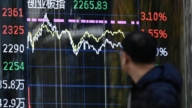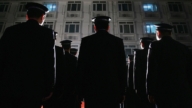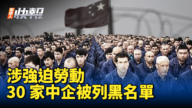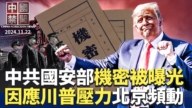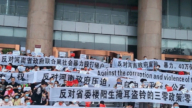【新唐人2013年08月29日讯】中共中央政治局召开会议,决定将在11月召开第十八届三中全会,议程确定将讨论改革。在这次政治局会议中,还通过了一些关于治理腐败的所谓工作规划。专家分析,当局将会继续利用反腐败这个旗号,打击政治对手。而在这届的三中全会中,中共内部的利益集团格局,也将会有一个巨大调整。
中共媒体报导说,中共总书记习近平8月27号主持召开了政治局会议,会议决定,11月在北京召开第十八届中央委员会第三次全体会议,三中全会的主要内容涉及改革。
此外,会议还审议通过了所谓的《建立健全惩治和预防腐败体系2013-2017年工作规划》、《关于地方政府职能转变和机构改革的意见》,听取了中国(上海)自由贸易试验区筹备工作汇报。
北京时政观察人士华颇认为,这次会议透露出中共将对它的反腐体制和反腐机构进行一些改革。
北京时政观察人士华颇:“以往的反腐体制纪委都是在当地党委的领导之下,所以它反腐并不能监督当地的主要是党政一把手他们的违纪行为,所以出现了如果一些党员干部违纪的情况,当地的纪委首先想到的是掩盖而不是追究这些违纪违法干部的责任。”
华颇指出,改革后,中纪委将直接对基层纪委垂直领导,就是以后各级纪委不在由当地的党委直接管治。
2004年,中共前党魁胡锦涛、温家宝上台曾提出过这一改革方案,但是遭到各地方党政,党委政府坚决反对,最后不了了之。
不过,即使中纪委能直接管控基层纪委,外界质疑,中纪委的权力又由谁去监管呢?
时事评论员石静笛:“众所周知中共的反腐败是以腐败的名义打击政治对手,它现在要继续反腐败就说明中共内部对权力和利益的争夺,它的内斗并没有达到一个平衡,其实从刚刚结束的薄熙来案庭审也能看出端倪。”
刚刚结束的、持续5天的薄熙来贪污受贿,滥用职权一案庭审中,薄否认了对他的所有指控,26号,公诉人宣布薄犯罪证据确凿,拒不认罪,必须严惩。
华颇分析,中共对薄案的审判,可能会对各地大员形成一种威慑,让他们不敢在三中全会中直接挑战习中央的权威。
华颇:“我想开这个会,直接的明目张胆的反对习各种政策情况可能不会发生,但是中国政治文化也可能会下边会打一些太极拳,以柔克钢,明不顶暗抗,使习的这些政策落空的危险还是有的。”
此外,华颇分析,这次三中全会中共对利益集团应该有一个巨大的调整,首先会打破原有的利益格局。
华颇:“这个利益格局很多,房地产开发集团,地方政府,还有国有企业,垄断企业,金融等,比如这次严查了中石油能源部门,加大了清洗力度,我想这也是反腐的一个手段,清洗一批人而达到改革的目的。下一步我想会加大一些对反垄断的一些制裁力度。”
薄案庭审结束的这两天内,中石油系统接连有4名副总裁级别的高管落马。这是前中共中央政法委书记周永康家族垄断的企业。这次石油系统反腐是否向上延烧,公众试目以待。
采访编辑/李韵 后制/周天
Third Plenary Session Scheduled, Communist Party may Intensify clean up
Recently the Central Politburo held a meeting and
scheduled a third Plenary Session of the 18th Chinese
Communist Party (CCP) in Beijing for November.
They will discuss the reform issue in November.
The Central Politburo has approved plans of anti-corruption.
Analysts said that authorities will continue to use the
banner of anti-corruption, fighting political opponents.
In the third Plenary Session, the structure
of the CCP will be reshuffled.
The CCP’s media reported that Xi Jinping
chaired the Politburo meeting on 27th August.
They discussed the details of the agenda for November’s
meeting, the focus topic will be the reform.
In addition, the Politburo meeting has approved
a working plan of anti-corruption for 2013-2017,
the change of local government functions and reform opinions.
They listened to the report of preparing a
Shanghai free trading zone.
Hua Po, a Beijing current affairs observer said that
the Politburo meeting revealed that the CCP will make
reforms on anti-corruption system and anti-corruption organs.
Hua Po: “In the past, anti-corruption disciplinary departments
were under the leadership of the CCP committee,
the anti-corruption units weren’t really supervised.
Since the local CCP boss is often corrupt,
if the members are corrupt, the first thing for
the local CCP top cadres to do is to cover it up,
but not to investigate the responsibilities."
Hua Po said that after the reform, the central disciplinary
department will directly control the local department.
The local party committee will no longer be
in charge of the local disciplinary department.
In 2004, Hu Jintao and Wen Jiabao proposed a reform plan,
but it was resolutely rejected by local party committees.
Thus nothing has happened.
However, although the central disciplinary department
controls local departments, outsiders questioned,
who will supervise the central disciplinary department?
Shi Jingdi, current affairs commentator:
“We all know that the purpose of CCP’s
anti-corruption campaign is to fight political opponents.
Now the CCP is continuing to fight anti-corruption,
it indicates that the CCP internally are
struggling for power and interests.
Its infighting hasn’t reached a balance yet.
Actually, Bo Xilai’s trial reflects this issue."
In the closure of the five-day trial, Bo Xilai was
accused of bribery, corruption and abuse of power.
Bo denied all the charges.
The prosecutors stated on 26th August that
they have enough evidence of Bo’s crimes,
however, Bo completely denied them,
he should be given a severe punishment.
Hua Po analyzes that the CCP opened
Bo’s trial to the public,
in doing so, it might terrorize the
local high-ranking officials.
So that they dare not directly challenge Xi Jinping’s
power in the upcoming Third Plenary Session.
Hua Po: “I think it is unlikely someone
will dare to challenge Xi’s policies directly.
However, the local officials may use a soft way
like playing Tai-Chi quan, and indirectly resist Xi.
It is possible that Xi’s policies can’t be carried out."
Hua Po said that in this years’ Third Plenary Session,
the CCP’s interest groups should have a huge adjustment,
the original structure will be broken.
Hua Po: “There are many interest groups,
such as house development, local governments,
state-owned businesses,
monopoly enterprises and financial industry.
Recently, the investigation on China
National Petroleum, intensified the clearing out.
I think this is one of the anti-corruption actions.
Clearing out some people to achieve the aim of reform.
I think the next step will be to increase
the effort against monopolies."
Within two days since the end of Bo Xilai’s trial,
The China Oil Company removed four top officials.
The oil industry is monopolized by Zhou Yongkang’s family.
Whether the investigation will move upward in oil industry,
we will soon see.


